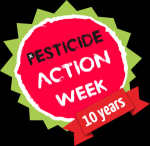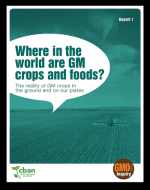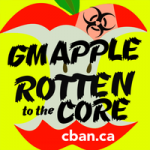Articles
01.04.2015 | permalink
Non-GMO Food Sales Rising Fast
Non-GMO food sales are rising faster than buttermilk biscuits in a warm oven. and are staged to become hot products of the future. Farmers, especially younger entrepreneurs, are quickly trying to move into the market and tap into a new profitable demand.
Genetically modified organisms (GMO) refers to how food, food from meats to produce. is grown, processed, and distributed to the public. Pesticides, hormones given to livestock, and genetic engineering of seeds to make more attractive, marketable vegetables, are all part of the GMO process. A large reason for tinkering with food is to produce more on smaller tracts of land, make drought or pest-resistant produce, and to delay spoilage, so food can be shipped globally. The thought is GMO products eventually produce ill-effects in humans like cancer, infertility, and other issues.
In recent years, many people have found they are allergic to gluten, a binding ingredient used in wheat products, and seek gluten-free products. Others concerned about health seek out organic products. Now, people are specifically looking for non-GMO products. All certified organic products are, by definition, also non-GMO products.
30.03.2015 | permalink
Consumers Union urges Congress to oppose bill to prevent states from labeling GMO foods
Washington, D.C.—Consumers Union, the public policy and advocacy arm of Consumer Reports, is urging Congress to reject the proposals contained in the misleadingly named “Safe and Accurate Food Labeling Act of 2015,” which was reintroduced by Rep. Mike Pompeo (R-KS) today. The bill would prohibit states from establishing or carrying out mandatory labeling of genetically engineered (GE) food, and would explicitly allow GE foods, known as GMOs, to be labeled “natural.”
“Consumers have a right to know if their food has been genetically engineered,” said Jean Halloran, Director of Food Policy Initiatives at Consumers Union. “States should not be prohibited from requiring GE labeling.”
The bill would direct the U.S. Food and Drug Administration (FDA) to continue its current policy, in which any labeling of genetically engineered food must be the voluntary choice of the food producer. The bill was reintroduced just days after a World Health Organization research arm, the International Agency for Research on Cancer (IARC), categorized the herbicide glyphosate (trade name Roundup), used on virtually all GE crops, as a “probable carcinogen.”
Consumers Union senior scientist Michael Hansen, Ph.D. said, “The new status of glyphosate, so widely used on genetically engineered crops, as a probable carcinogen, heightens consumer concern and increases consumer support for mandatory labeling.”
- Consumers Union: Consumers Union urges Congress to oppose bill to prevent states from labeling GMO foods
- Civil Eats: Study Links Widely Used Pesticides to Antibiotic Resistance
- Greenpeace International: Glyphosate's under the spotlight
- Biosafety Information Centre: Glyphosate Declared a Probable Carcinogen to Humans by WHO
27.03.2015 | permalink
European Patent Office upholds patents on broccoli and tomato
Patents on plants and animals derived from conventional breeding can also be granted in future
Munich 27 March, 2015
The Enlarged Board of Appeal of the European Patent Office (EPO) has decided on the precedent cases of broccoli and tomato (G2 / 12 and G2 /13). The EPO made clear that while processes for crossing and selection cannot be patented, plants and animals stemming from these processes are still patentable. This illogical decision was a long awaited outcome of a precedent case on the patentability of plants and animals derived from conventional breeding. The coalition No Patents on Seeds! has heavily criticised this decision. The organisations are warning about the increasing monopolisation of breeding of plants and animals needed for food production.
“The EPO has paved the way for companies such as Monsanto, Syngenta and others to take control of resources we all need for our daily lives. We call upon European governments to put political pressure on the EPO to change its practice”, says Christoph Then for No Patents on Seeds! “No company should hold monopolies on sunlight, air or water. The same is true for the resources needed for food production.”
- no patents on seeds: European Patent Office upholds patents on broccoli and tomato
- no patents on seeds: Opposition against the Monsanto Patent on Severed Broccoli
- European Patent Office: EPO - G 0002/12 () of 25.3.2015
- European Patent Office: EPO - G 0002/13 () of 25.3.2015
- Intellectual Property Watch: Patent On Conventional Plant Dismissed For Lack Of Novelty, Firm Says
25.03.2015 | permalink
Glyphosate: Study Links Widely Used Pesticides to Antibiotic Resistance
Glyphosate, 2,4-D, and dicamba found to affect bacteria in ways that could promote resistance to common antibiotics.
By Elizabeth Grossman on March 24, 2015
This has not been a good week for glyphosate, the active ingredient in Roundup and other herbicides. On Friday, the World Health Organization (WHO) announced that it had classified glyphosate, the United States’ most widely-used pesticide, as “probably carcinogenic to humans.”
Now, the chemical has another strike against it. A study published today by the American Society of Microbiology’s journal mBio has linked glyphosate and two other widely-used herbicides–2,4-D and dicamba–to one of the most pressing public health crises of our time: antibiotic resistance.
This study found that exposure to these herbicides in their commercial forms changed the way bacteria responded to a number of antibiotics, including ampicillin, ciprofloxacin, and tetracycline–drugs widely used to treat a range of deadly diseases.
- Biosafety Information Centre: Study Links Widely Used Pesticides to Antibiotic Resistance
- doi: 10.1128/mBio.00009-15, 24 March 2015: Sublethal Exposure to Commercial Formulations of the Herbicides Dicamba, 2,4-Dichlorophenoxyacetic Acid, and Glyphosate Cause Changes in Antibiotic Susceptibility in Escherichia coli and Salmonella enterica serovar Typhimurium
- Biosafety Information Centre: Exposure to herbicides can cause change in bacterial response to antibiotics
25.03.2015 | permalink
Is there glyphosate in your diet?
No one knows how much of this pesticide is in the produce we eat
The herbicide glyphosate, known by the commercial name Roundup, is the most commonly used agricultural pesticide in the U.S. on farms. (Home gardeners use it too.) Yet we have no idea how much of it is in our food because the government doesn’t regularly test produce for it.
Glyphosate use has increased tenfold in the past 20 years thanks to the rise in genetically modified corn and soy. Most of those crops are engineered to be resistant to glyphosate, which means Roundup will kill the weeds but not the crops. According to Charles Benbrook, Ph.D., of Washington State University, data shows that U.S. farmers used enough glyphosate in 2014 to apply the equivalent of almost three-quarters of a pound on every acre of farmland used to grow crops. “When a single pesticide is used that widely, people can’t help but be exposed to it,” Benbrook says.
- Consumer Reports: Is there glyphosate in your diet?
- Consumer Reports: Pesticides in Produce
- Nature News & Comment: Widely used herbicide linked to cancer
- Fox News: Monsanto seeks retraction for report linking herbicide to cancer
- doi: 10.1128/mBio.00009-15, 24 March 2015: Sublethal Exposure to Commercial Formulations of the Herbicides Dicamba, 2,4-Dichlorophenoxyacetic Acid, and Glyphosate Cause Changes in Antibiotic Susceptibility in Escherichia coli and Salmonella enterica serovar Typhimurium
24.03.2015 | permalink
Pesticide Action Week: No Pesticides, No GMOs

As pesticide action week is set to begin, one may reflect on the fact that GMOs have been sold primarily as a way of reducing the use of pesticides. Shouldn't we then celebrate this way to reduce our pesticide addiction and embrace a great new agricultural technology? The first point to consider is the fact that it is the pesticides companies that make and patent these GMO crops, and that alone should make us rather sceptical about the argument. Is it really logical for a company to try to sell less of its products? Furthermore, let's not forget that these companies have fiercely opposed all EU proposals to reduce the use of pesticides. With economic and pseudo-scientific arguments, they have gone as far as suing the Commission for its moratorium on some uses of certain neonicotinoids, and enrolling scientists to try and minimise the health and environmental impacts of those. This can only make us question their claims that GMOs are safe.
Let's take a quick look at what we're dealing with after 20 years of growing GMO crops:
There are only two main traits which have been engineered in crops: tolerance to herbicides and the production of insecticides.
23.03.2015 | permalink
World Health Organization: Monsanto weed killer can 'probably' cause cancer

CHICAGO (Reuters) - The world's most widely-used weed killer can "probably" cause cancer, the World Health Organization said on Friday.
The WHO's cancer arm, the International Agency for Research on Cancer (IARC), said glyphosate, the active ingredient in the Monsanto Co herbicide Roundup, was "classified as probably carcinogenic to humans".
- Business Insider: World Health Organization: Monsanto weed killer can 'probably' cause cancer
- IARC - INTERNATIONAL AGENCY FOR RESEARCH ON CANCER: IARC Monographs Volume 112: evaluation of five organophosphate insecticides and herbicides
- IARC Monographs Volume 112: evaluation of five organophosphate insecticides and herbicides
- International Agency for Research on Cancer: IARC Monographs- Classifications
- CANCER March 15, 1999 / Volume 85 / Number 6: A Case–Control Study of Non-Hodgkin Lymphoma and Exposure to Pesticides
- CTV News: Winnipeg to review mosquito insecticide after WHO finds possible cancer link
23.03.2015 | permalink
UK: GM ingredients in Domino's and Waitrose

Commenting on the news that Domino's is selling GM pizza bases, and Waitrose has started stocking GM Hershey's bars GM Freeze Director Liz O'Neill said:
Imported American sweets are bad enough but if Domino’s are making GM pizza bases here in the UK then they really are out of step with their customers. People in the UK have demonstrated time and again that they don’t want to eat GM food and the Food Standards Agency’s public attitudes survey recently showed concern about GM at an all-time high. Whether motivated by concern for declining wildlife and flourishing superweeds, wider ethical issues, safety or personal preference, we have a right to make an informed choice and the conflicting statements on the Domino’s website currently make that virtually impossible.
23.03.2015 | permalink
New report: Where in the world are GM crops and foods?

Where in the world are GM crops and foods?
The reality of GM crops in the ground and on our plates
Report 1 | March 2015
In this first report of the GMO Inquiry 2015, we investigate what genetically modified (GM) crops are grown in Canada and around the world, where they are being grown, how much of each one is being grown, and where they end up in our food system.
“Where in the world are GM crops and foods?” is the first in a series of reports that investigate unanswered questions from 20 years of GMOs in Canada. Watch this space for future reports, and join us as we examine the impacts of GM crops on our environment, on our food and farming systems, and on our health.
23.03.2015 | permalink
Health Canada approved GM apple - 69% of Canadians oppose the GM apple

Okanagan residents react to Arctic Apple approval by Health Canada
KELOWNA – After more than three years waiting for approval, the Okanagan’s Arctic Apple now has the green light to hit store shelves in Canada. The genetically modified apple doesn’t turn brown and Health Canada’s approval means it could hit store shelves as early as next year.
While it may be good for Okanagan Specialty Fruits (OSF), the company behind the apple, the Okanagan Fruit Growers’ Association (BCFGA) has some concerns.
“If you’re going to let the market decide, you’re going to have to give people a reference point to make a decision based on their personal purchasing habits, and I would assume that would be through some kind of labeling,” says BCFGA president Fred Steele.
